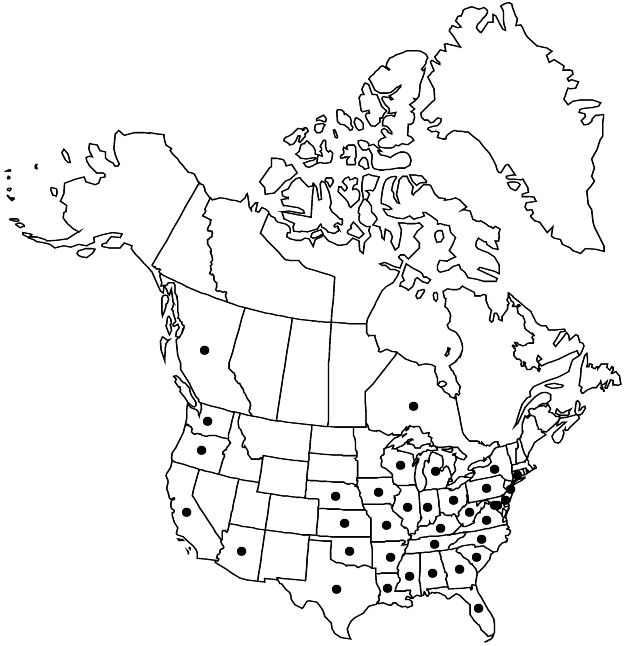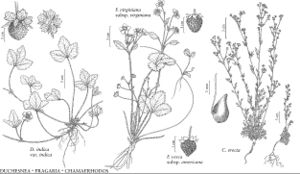Difference between revisions of "Duchesnea indica var. indica"
FNA>Volume Importer |
imported>Volume Importer |
||
| (6 intermediate revisions by 2 users not shown) | |||
| Line 1: | Line 1: | ||
{{Treatment/ID | {{Treatment/ID | ||
|accepted_name=Duchesnea indica var. indica | |accepted_name=Duchesnea indica var. indica | ||
| − | |accepted_authority= | + | |accepted_authority= |
|publications= | |publications= | ||
|basionyms= | |basionyms= | ||
| Line 19: | Line 19: | ||
|elevation=0–700[–3200] m | |elevation=0–700[–3200] m | ||
|distribution=B.C.;Ont.;Ala.;Ariz.;Ark.;Calif.;Conn.;Del.;D.C.;Fla.;Ga.;Ill.;Ind.;Iowa;Kans.;Ky.;La.;Md.;Mich.;Miss.;Mo.;Nebr.;N.J.;N.Y.;N.C.;Ohio;Okla.;Oreg.;Pa.;S.C.;Tenn.;Tex.;Va.;Wash.;W.Va.;Wis.;Asia;introduced also in South America;Europe;Africa. | |distribution=B.C.;Ont.;Ala.;Ariz.;Ark.;Calif.;Conn.;Del.;D.C.;Fla.;Ga.;Ill.;Ind.;Iowa;Kans.;Ky.;La.;Md.;Mich.;Miss.;Mo.;Nebr.;N.J.;N.Y.;N.C.;Ohio;Okla.;Oreg.;Pa.;S.C.;Tenn.;Tex.;Va.;Wash.;W.Va.;Wis.;Asia;introduced also in South America;Europe;Africa. | ||
| + | |introduced=true | ||
|tables= | |tables= | ||
|references= | |references= | ||
| Line 27: | Line 28: | ||
-->{{#Taxon: | -->{{#Taxon: | ||
name=Duchesnea indica var. indica | name=Duchesnea indica var. indica | ||
| − | + | |authority= | |
| − | |authority= | ||
|rank=variety | |rank=variety | ||
|parent rank=species | |parent rank=species | ||
| Line 43: | Line 43: | ||
|publication year= | |publication year= | ||
|special status= | |special status= | ||
| − | |source xml=https:// | + | |source xml=https://bitbucket.org/aafc-mbb/fna-data-curation/src/2e0870ddd59836b60bcf96646a41e87ea5a5943a/coarse_grained_fna_xml/V9/V9_437.xml |
|subfamily=Rosaceae subfam. Rosoideae | |subfamily=Rosaceae subfam. Rosoideae | ||
|tribe=Rosaceae tribe Potentilleae | |tribe=Rosaceae tribe Potentilleae | ||
Latest revision as of 22:56, 5 November 2020
Stolons (1–)3–10(–13) dm. Leaves: stipules 5–8 mm, sparsely villous; petiole 2–20 cm, pilose; leaflets petiolulate, (1–)3–5(–7) × (0.8–)1–3 cm, abaxial surface sparsely strigose, adaxial pilose or glabrous. Petioles 2–10(–13) cm. Flowers: epicalyx bractlets spreading to slightly reflexed, obovate, 4–12 × 4–10 mm, 3(–5)-toothed apically, foliaceous, sparsely villous at least on teeth and veins; sepals (3–)4–10 mm, margins entire; petals 4–8(–11) × 3–6(–8) mm, apex rounded to truncate or emarginate; styles 1–1.5 mm. Achenes red, 1–1.5 mm, smooth, glossy. 2n = 84.
Phenology: Flowering spring–fall.
Habitat: Roadsides, cultivated fields, lawns, gardens, waste places, disturbed areas, occasionally in moist places
Elevation: 0–700[–3200] m
Distribution

Introduced; B.C., Ont., Ala., Ariz., Ark., Calif., Conn., Del., D.C., Fla., Ga., Ill., Ind., Iowa, Kans., Ky., La., Md., Mich., Miss., Mo., Nebr., N.J., N.Y., N.C., Ohio, Okla., Oreg., Pa., S.C., Tenn., Tex., Va., Wash., W.Va., Wis., Asia, introduced also in South America, Europe, Africa.
Discussion
Selected References
None.
